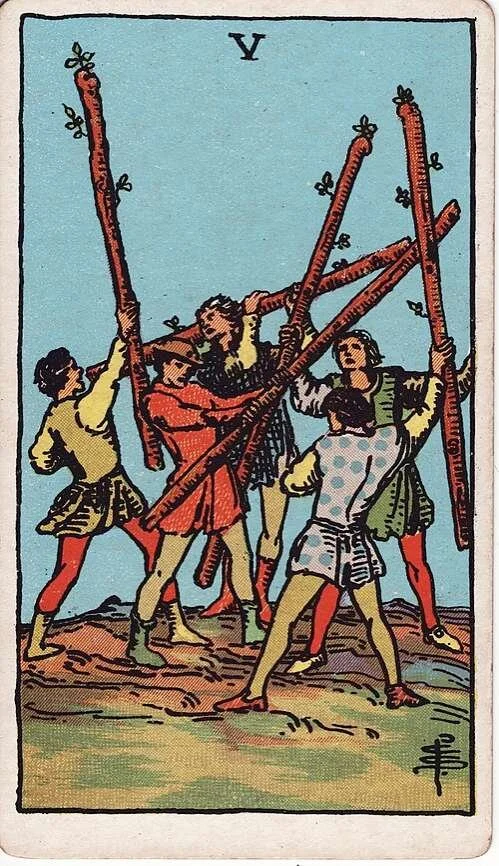Five of Wands: Modern RWS Tarot Card Meanings
‘Five of Wands’, Rider Waite Smith tarot deck.
RWS Five of Wands Meanings
Upright Keywords
Conflict, Competition, Disagreements, Tension, Struggle, Rivalry
Generally
The Five of Wands signifies a period of struggle and competition, but often in a way that is productive or not seriously harmful. It represents the tension that arises from clashing egos and different ideas, where various forces are all vying for dominance. This is the energy of a brainstorming session where everyone is talking over each other, or the friendly but intense rivalry of a competitive sport. In daily life, this can manifest as a heated debate with friends that clears the air, a chaotic family argument over trivial matters, or navigating the minor conflicts and power plays of office politics. It points to a situation where there is a lot of scattered energy and a lack of unified direction.
In a Love Context
In matters of love, this card often points to the bickering and minor disagreements that are a natural part of a passionate partnership. It represents a clash of wills between partners, where both individuals are assertive and unwilling to back down. This is not necessarily a sign of a failing relationship; rather, it can be the healthy friction that leads to a stronger understanding and mutual respect. It can signify rivalry for affection or attention, or arguments over small domestic issues. The Five of Wands depicts the energy of a couple who are engaged and passionate, even if that passion currently manifests as conflict.
In a Money/Career Context
This card can represent a competitive work environment where a healthy rivalry pushes everyone to perform better. It points to a project that involves a productive clash of ideas, such as a brainstorming session where many different opinions are debated before the best one is chosen. It might signify several colleagues competing for the same promotion in a way that is ambitious but not destructive, or the necessary struggle to get your ideas heard in a crowded marketplace. The conflict, while challenging, is often a necessary part of the creative or professional process that leads to a stronger outcome.
In a Spiritual Context
This can signify a period of productive internal conflict on a spiritual path. It may represent a "dark night of the soul" where you are actively wrestling with your own beliefs in a way that leads to profound growth and a more robust personal philosophy. It can also point to a challenging but ultimately fruitful debate with a spiritual teacher or the necessary struggle to reconcile different, seemingly contradictory, aspects of your own esoteric studies. This is not a crisis of faith, but an active engagement with complex spiritual questions.
In Common Spread Positions
As Advice
Stand up for your beliefs. Engage in the debate. Embrace healthy competition. Do not shy away from the struggle.
As (Ultimate) Outcome
A period of conflict. A competitive struggle. A necessary argument. A clash of egos.
As Obstacles
Petty arguments are blocking progress. A lack of co-operation. Too many competing egos are creating chaos.
As Hidden Energy
An unspoken tension. A brewing conflict that has not yet surfaced. A secret rivalry.
As Resources/Alliances
A competitive environment that pushes you to be better. The creative energy of a debate. A sparring partner.
The RWS Five of Wands: Reversed Meanings
Reversed Keywords
Avoiding Conflict, Finding Common Ground, Resolution, Harmony, Peace
Generally
Reversed, the Five of Wands can point to the end of a conflict or a conscious decision to avoid it. It signifies finding a compromise, letting go of a pointless argument, or a period of inner peace after a prolonged struggle. However, it can also carry a warning. A deep-seated fear of confrontation can lead to festering resentment or avoiding a necessary discussion, creating a false and fragile peace that does not address the root of the problem.
In a Love Context
This card often signifies the resolution of a conflict in a relationship and a welcome move towards harmony. It can be making up after a fight, finding common ground on a difficult issue, or a conscious decision to stop the cycle of bickering. It represents a more peaceful partnership. Negatively, it can mean a couple that is avoiding a major, necessary conversation about an issue, choosing a superficial peace over a deeper, more honest connection.
In a Money/Career Context
This can mean the end of a period of intense competition at work, a successful negotiation, or a peace treaty between rival colleagues. It might represent a team finally coming together after a period of conflict, the resolution of a business dispute, or a personal decision to step away from a toxic, overly competitive environment. It can also warn of a false harmony where important disagreements are being suppressed for the sake of an easy life, which may harm a project in the long term.
In a Spiritual Context
This can mean finding inner peace after a period of spiritual doubt or internal struggle. It may represent the resolution of a conflict with a spiritual belief system, a new sense of inner harmony, or a conscious decision to walk away from a dogmatic group that no longer resonates. It is the end of an internal war and the beginning of a more peaceful and integrated spiritual practice.
In Common Spread positions
As Advice
Find a compromise. Let go of the fight. Seek common ground. Avoid unnecessary conflict.
As (Ultimate) Outcome
A peaceful resolution. The end of a struggle. A successful negotiation. Harmony restored.
As Obstacles
A fear of confrontation is preventing a necessary discussion. An unwillingness to compromise. A false sense of peace is masking a real problem.
As Hidden Energy
A secret desire for peace. An unacknowledged fear of conflict is driving your actions. The potential for a peaceful resolution.
As Resources/Alliances
Help comes from a skilled negotiator or mediator. The ability to see all sides of an argument. A willingness to compromise.
Additional Notes on The RWS ‘Five of Wands’
Waite’s Divinatory Meanings of The Five of Wands
"Mimic warfare, and as such it is now conceived in a sense of sport; hence also it is the strife of riches and fortune, in the form of a contest. It is on the surface a play of swords, but there is some suggestion of a struggle for existence. Reversed: Trickery, contradiction, litigation, disputes." (The Pictorial Key to the Tarot, 1911)
RWS Five of Wands Symbolism
A.E. Waite’s Five of Wands depicts five young men brandishing wands, engaged in what appears to be a mock battle or a chaotic, disorganised competition. Their staves are crossed and clash in the centre of the scene, indicating a conflict of ideas or a struggle for dominance. No one has a clear advantage, and the overall atmosphere is one of tension, rivalry, and a scattered release of energy. The scene is an allegory for the experience of conflict, competition, and the clash of individual wills.
Meditations On The Five of Wands
Is the conflict in my life productive, or is it just a pointless struggle?
Am I competing in a healthy way, or am I driven by ego?
Is it time to stand my ground and fight, or is it time to seek peace and compromise?
Continue Reading: RWS Minor Arcana
Suit of Wands | Suit of Cups | Suit of Swords | Suit of Pentacles | All Minor Arcana
Next Card: The Four of Wands
Previous Card: The Six of Wands


